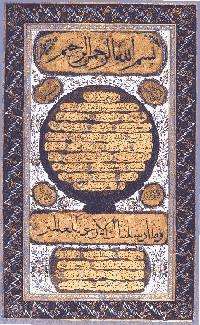Al-Kafirun
Al-Kāfirūn[1] (Arabic: الكافرون, "The Unbelievers") is the name of the 109th chapter (sūrah) of the Quran. It has six verses as follows:
- [2] Say, "O disbelievers,
- I do not worship what you worship.
- Nor are you worshippers of what I worship.
- Nor will I be a worshipper of what you worship.
- Nor will you be worshippers of what I worship.
- For you is your religion, and for me is my religion."[3]
| الكافرون Al-Kāfirūn The Disbelievers | |
|---|---|
| Classification | Meccan |
| Other names | Atheists, The Unbelievers |
| Position | Juzʼ 30 |
| No. of verses | 6 |
| No. of words | 27 |
| No. of letters | 98 |
| Quran |
|---|
 |
|

Summary
Like many of the shorter surahs, the surah of the unbelievers takes the form of an invocation, telling the reader something they must ask for or say aloud. Here, the passage asks one to keep in mind the separation between belief and unbelief both in the past and the present, ending with the often cited line "To you your religion, and to me mine". Although some view this as an argument against religious intolerance, others see it as a more time-specific revelation, warning the newly founded Muslim minority in Mecca against being induced (by the Quraish Arab tribe majority) to collude with disbelievers.
It was revealed in Mecca when the Muslims were persecuted by the polytheists of Mecca.
Cause of revelation
"Wahb bin Munabbih has related that the people of Quraish said to Allah's' Messenger: 'If you like we would enter your faith for a year and you would enter our faith for a year.'" (Abd bin Humaid, Ibn Abi Hatim). [4] "...In this way, if what you have brought us is better than what we have, we would partake of it and take our share of goodness from it; and if what we have is better than what you have brought, you would partake of it and take your share of goodness from it."[5]
Hadith
As for the esteem in which Muhammad held this surah, it can be judged from the following few hadith:
- Abdullah ibn Umar has related that on many an occasions he heard Muhammad recite Surahs Qul Ya- ayyuhal- kafirun and Qul Huwu-Allahu ahad in the two rakats before the Fajr obligatory prayer and in the two rakats after the Maghrib obligatory prayer.[6]
- Khabbab ibn al-Aratt says: "The Holy Prophet (upon whom be peace) said to me: when you lie down in bed to sleep, recite Qul ya-ayyuhal kafirun, and this was the Holy Prophet's own practice also; when he lay down to sleep, he recited this Surah."[7]
- According to Ibn Abbas, Muhammad said to the people: "Should I tell you the word which will protect you from polytheism? It is that you should recite Qul ya-ayyuhal kafirun when you go to bed."[8]
- Anas says that Muhammad said to Mu'adh bin Jabal; "Recite Qul ya-ayyuhal-kafirun at the time you go to bed, for this is immunity from polytheism." [9][10]
- Both Fardah bin Naufal and Abdur Rahman bin Naufal have stated that their father, Naufal bin Muawiyah al-Ashjai, said to Muhammad: "Teach me something which I may recite at the time I go to bed." Muhammad replied: "Recite Qul ya-ayyuhal kafirun to the end and then sleep, for this is immunity from polytheism." [11] A similar request was made by Jabalah bin Harithah, brother of Said bin Harithah, to Muhammad and to him also he gave the same reply.[12]
- Muhammad recited in the two rakahs before the morning prayer and the two rakahs after the sunset prayer on ten or twenty occasions: Say O' al-Kafirun and say He is God, the One (surah 112: al-Ikhlas).[13]
References
- Ibn Kathir. "Tafsir Ibn Kathir (English): Surah Al Kafirun". Quran 4 U. Tafsir. Retrieved 29 March 2020.
- Arabic script in Unicode symbol for a Quran verse, U+06DD, page 3, Proposal for additional Unicode characters
- Sahih International translation
- The Noble Quran https://quran.com/109
- al-Wahidi, Ahmad. "Asbab Al-Nuzul". Altafsir.com. oyal Aal al-Bayt Institute for Islamic Thought. Retrieved 17 July 2019.
- Several traditions on this subject with a little variation in wording have been related by Imam Ahmad, Tirmidhi, Al-Nasa'i, Ibn Majah, Ibn Hibban, Ibn Marduyah from ibn Umar.
- Abu Bakr Al-Bazzar, Al-Tabarani, Ibn Marduyah
- Abu Ya'la, Al-Tabarani
- Al-Bayhaqi in Ash-Shu'ab
- Abu Dawud: 4396 & Hakim ibn Hizam 1/565
- (Musnad Ahmad, Abu Dawud, Tirmidhi, Al-Nasa'i, Ibn Abi Shaibah, Hakim ibn Hizam, Ibn Marduyah, Al-Bayhaqi in Ash-Shuab).
- (Musnad Ahmad, Al-Tabarani).
- Imam Ahmad recorded from ibn Umar